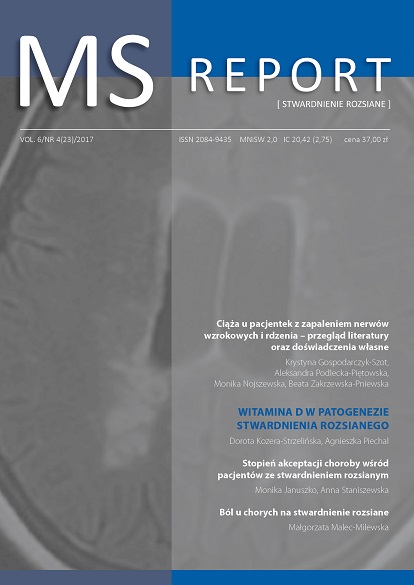Vitamin D in the pathogenesis of multiple sclerosis Review article
Main Article Content
Abstract
Multiple sclerosis (MS) is a chronic, inflammatory autoimmune disease of the central nervous system caused by the demyelination process. A high risk of developing MS is associated with poor exposure UVB radiation and consequently low level vitamin D in the body. MS is most often diagnosed in young adults who are professionally active. An increasing number of studies suggest that lower levels of vitamin D in serum correlate with an increased risk of MS and a more severe course of the disease.
In this article, we present current knowledge about the role of vitamin D in the pathogenesis of MS. Recent data prove that vitamin D supplementation should be used as supportive therapy, especially in the winter-spring period. To date, no clear guidelines for the use of vitamin D in MS have been established. Ongoing studies are promising, i.e. establishing a safe and effective dose of supplementation in this group of patients, adjusting it individually depending on the form of the disease and individual variability.
Article Details
Copyright © by Medical Education. All rights reserved.
References
2. Simpson S., Blizzard L., Otahal P. et al.: Latitude is significantly associated with the prevalence of multiple sclerosis: A meta-analysis. J. Neurol. Neurosurg. Psychiatry 2011; 82(10): 1132-1141.
3. Zittermann A., Schleithoff S.S., Koerfer R.: Vitamin D insufficiency in congestive heart failure: Why and what to do about it? Heart Fail Rev. 2006; 11(1): 25-33.
4. Gorham E.D., Garland C.F., Garland F.C. et al.: Optimal vitamin D status for colorectal cancer prevention: a quantitative meta analysis. Am. J. Prev. Med. 2007; 32(3): 210-216.
5. Kuryłowicz A., Bednarczuk T., Nauman J.: Wpływ niedoboru witaminy D na rozwój nowotworów i chorób autoimmunologicznych. The influence of vitamin D deficiency on cancers and autoimmune diseases development. Endokrynol. Pol./Pol. J. Endocrinol. 2007; 58(2): 140-152.
6. Ponsonby A.L., Pezic A., Ellis J. et al.: Variation in associations between allelic variants of the vitamin D receptor gene and onset of type 1 diabetes mellitus by ambient winter ultraviolet radiation levels: A meta-regression analysis. Am. J. Epidemiol. 2008; 168(4): 358-365.
7. Hanwell H.E.C., Banwell B.: Assessment of evidence for a protective role of vitamin D in multiple sclerosis. Biochim. Biophys. Acta. 2011; 1812(2): 202-212.
8. Degelman M.L., Herman K.M.: Smoking and Multiple Sclerosis: A systematic review and meta-analysis using the Bradford Hill criteria for causation. Mult. Scler. Relat. Disord. 2017; 17: 207-216.
9. Matsunawa M., Amano Y., Endo K. et al.: The aryl hydrocarbon receptor activator benzo[a]pyrene enhances vitamin D3 catabolism in macrophages. Toxicol. Sci. 2009; 109(1): 50-58.
10. Mokry L.E., Ross S., Ahmad O.S. et al.: Vitamin D and Risk of Multiple Sclerosis: A Mendelian Randomization Study. PLoS Med. 2015; 12(8): e1001866.
11. Correale J., Ysrraelit M.C., Gaitan M.I.: Gender differences in 1,25 dihydroxyvitamin D3 immunomodulatory effects in multiple sclerosis patients and healthy subjects. J. Immunol. 2010; 185(8): 4948-4958.
12. Willer C.J., Dyment D.A., Sadovnick A.D. et al.; Canadian Collaborative Study Group: Timing of birth and risk of multiple sclerosis: population based study. BMJ 2005; 330(7483): 120.
13. Miclea A., Miclea M., Pistor M. et al.: Vitamin D supplementation differentially affects seasonal multiple sclerosis disease activity. Brain Behav. 2017; 7(8): e00761.
14. Soilu-Hänninen M., Airas L., Mononen I. et al.: 25-Hydroxyvitamin D levels in serum at the onset of multiple sclerosis. Mult. Scler. 2005; 11(3): 266-271.
15. Kampman M.T., Wilsgaard T., Mellgren S.I.: Outdoor activities and diet in childhood and adolescence relate to MS risk above the Arctic Circle. J. Neurol. 2007; 254(4): 471-477.
16. Islam T., Gauderman W.J., Cozen W., Mack T.M.: Childhood sun exposure influences risk of multiple sclerosis in monozygotic twins. Neurology 2007; 69(4): 381-388.
17. Pugliatti M., Riise T., Sotgiu M.A. et al.: Evidence of early childhood as the susceptibility period in multiple sclerosis: space-time cluster analysis in a Sardinian population. Am. J. Epidemiol. 2006; 164(4): 326-333.
18. Mirzaei F., Michels K.B., Munger K. et al.: Gestational vitamin D and the risk of multiple sclerosis in the offspring. Ann. Neurol. 2011; 70(1): 30-40.
19. Burton J.M., Kimball S., Vieth R. et al.: A phase I/ II dose-escalation trial of vitamin D3 and calcium in multiple sclerosis. Neurology 2010; 74(23): 1852-1859.
20. Scientific Opinion on the Tolerable Upper Intake Level of calcium. Scientific Opinion on the Tolerable Upper Intake Level of vitamin D. EFSA J. 2012; 10(7): 1-45.
21. Munger K.L., Hongell K., Åivo J. et al.: 25-Hydroxyvitamin D deficiency and risk of MS among women in the Finnish Maternity Cohort. Neurology 2017; 89(15): 1578-1583.
22. Mowry E.M., Waubant E., McCulloch C.E. et al.: Vitamin D status predicts new brain MRI activity in multiple sclerosis. Ann. Neurol. 2012; 72(2): 234-240.
23. Munger K.L., Köchert K., Simon K.C. et al.: Molecular mechanism underlying the impact of vitamin D on disease activity of MS. Ann. Clin. Transl. Neurol. 2014; 1(8): 605-617.
24. Løken-Amsrud K.I., Holmøy T., Bakke S.J. et al.: Vitamin D and disease activity in multiple sclerosis before and during interferon-β treatment. Neurology 2012; 79(3): 267-273.
25. Mowry E.M., Pelletier D., Gao Z. et al.: Vitamin D in clinically isolated syndrome: Evidence for possible neuroprotection. Eur. J. Neurol. 2016; 23(2): 327-332.
26. Smolders J., Menheere P., Kessels A. et al.: Association of vitamin D metabolite levels with relapse rate and disability in multiple sclerosis. Mult. Scler. 2008; 14(9): 1220-1224.
27. Marrie R.A., Beck C.A.: Preventing multiple sclerosis: To (take) vitamin D or not to (take) vitamin D? Neurology 2017; 89(15): 1538-1539.
28. Munger K.L., Levin L., Hollis B. et al.: Serum 25-hydroxyvitamin D levels and risk of multiple sclerosis. J. Am. Med. Assoc. 2006; 296(23): 2832-2838.
29. Sintzel M.B., Rametta M., Reder A.T.: Vitamin D and Multiple Sclerosis: A Comprehensive Review. Neurol. Ther. 2017 [Epub ahead of print].

